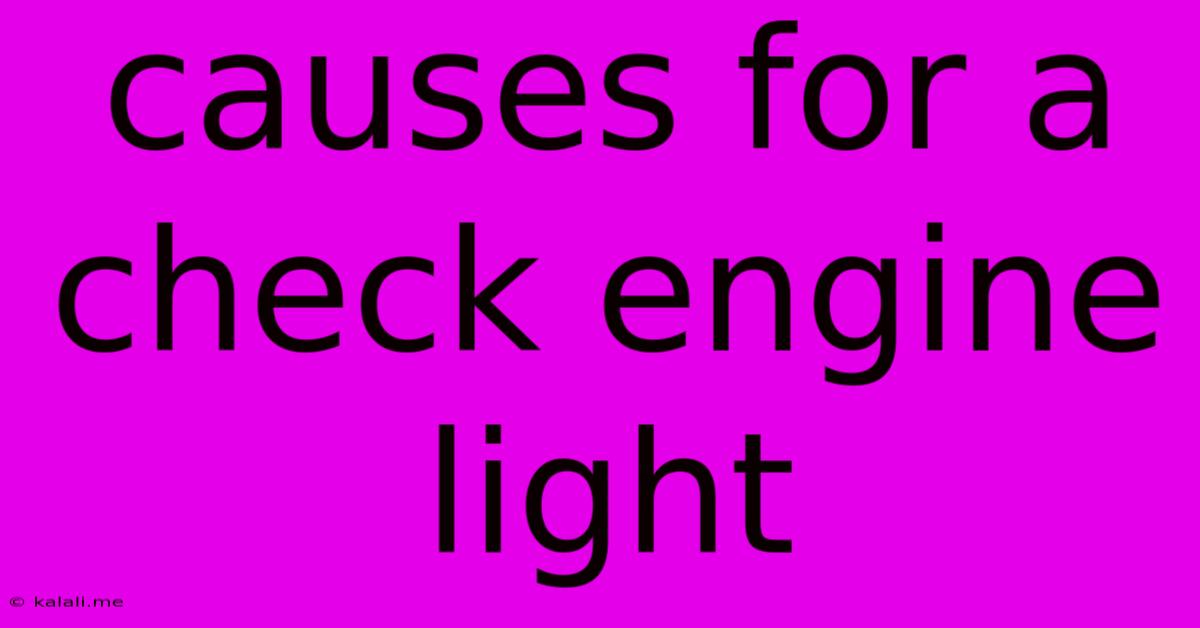Causes For A Check Engine Light
Kalali
Jun 01, 2025 · 4 min read

Table of Contents
Causes for a Check Engine Light: A Comprehensive Guide
Your check engine light illuminates, and suddenly, a wave of anxiety washes over you. What does it mean? Is it something minor, or a major engine problem demanding immediate attention? This guide breaks down the common causes for a check engine light, helping you understand what might be happening and how to proceed. This information is for general knowledge and shouldn't replace professional vehicle diagnostics.
The check engine light, often symbolized by an engine-shaped icon, is a vital warning system in your car. It indicates a problem detected by the onboard diagnostic system (OBD-II), signaling potential issues affecting your vehicle's performance, fuel efficiency, or emissions. Ignoring it can lead to more significant, and expensive, problems down the line.
Common Causes of a Check Engine Light
While a multitude of factors can trigger this warning, some are far more frequent than others. Let's explore the most prevalent reasons:
1. Loose or Damaged Gas Cap: Believe it or not, a simple, loose, or damaged gas cap is a very common culprit. This can cause small amounts of fuel vapor to escape, triggering the light. Tightening the cap often resolves the issue, and the light will typically turn off after a few driving cycles. If the light persists, the gas cap itself might need replacement.
2. Oxygen Sensor Malfunction: The oxygen sensor monitors the amount of oxygen in your exhaust system, crucial for efficient fuel combustion. A failing sensor can lead to inaccurate readings, affecting fuel efficiency and potentially causing engine damage. Symptoms might include reduced gas mileage or rough idling.
3. Mass Airflow Sensor Issues: The mass airflow sensor (MAF) measures the amount of air entering the engine. A dirty or faulty MAF sensor provides inaccurate information, disrupting the air-fuel mixture. This can result in poor engine performance, hesitation, or stalling. Cleaning the sensor (carefully!) might resolve the problem.
4. Catalytic Converter Problems: The catalytic converter reduces harmful emissions. If it's damaged or clogged, it can trigger the check engine light. Symptoms might include reduced engine power and a strange smell from the exhaust. This is a more serious issue and requires professional attention.
5. Spark Plug or Ignition Coil Failure: Faulty spark plugs or ignition coils prevent proper combustion, impacting engine performance and leading to the check engine light. Symptoms include misfires, rough running, and reduced fuel efficiency. Replacement is typically necessary.
6. Issues with the Exhaust System: Leaks in the exhaust system can impact the oxygen sensor readings and trigger the light. This is often accompanied by a loud exhaust roar or rumbling.
7. Problems with the PCV Valve: The positive crankcase ventilation (PCV) valve helps prevent crankcase pressure buildup. A faulty valve can cause excessive pressure and contribute to oil leaks or sludge buildup, eventually affecting engine performance.
8. Bad Throttle Position Sensor (TPS): The TPS measures the throttle position, sending information to the engine control unit (ECU). A malfunctioning TPS will throw off the fuel/air mixture, leading to poor performance.
9. Faulty Sensors: Many other sensors in the engine contribute to its smooth operation. Failure of sensors like the crankshaft position sensor, camshaft position sensor, or coolant temperature sensor can trigger the check engine light.
10. Low Engine Coolant: A low coolant level can trigger the light as a safety measure, indicating a possible overheating risk.
What to Do When the Check Engine Light Comes On
- Don't panic. While it's a warning sign, it doesn't automatically mean catastrophic failure.
- Check your gas cap. This is the easiest fix and often the solution.
- Note any changes in your vehicle's performance. This helps mechanics diagnose the issue.
- Use an OBD-II scanner. These inexpensive tools can read the diagnostic trouble codes (DTCs), providing more specific information about the problem.
- Consult a qualified mechanic. They can accurately diagnose the issue and recommend the necessary repairs.
Ignoring your check engine light is never advisable. Addressing the underlying problem promptly can prevent larger, more expensive repairs and ensures your vehicle's optimal performance and safety. Remember, this information is for educational purposes only. Always seek professional advice for accurate diagnosis and repair of your vehicle.
Latest Posts
Latest Posts
-
How Early Should You Arrive To A Basketball Game
Jun 02, 2025
-
Notch In The Belt Or On The Belt
Jun 02, 2025
-
Initiating Processes Take Place During Each Phase Of A Project
Jun 02, 2025
-
Can Ground Beef Be Cooked From Frozen
Jun 02, 2025
-
Did Any Of Jesus Disciples Have Gets Married
Jun 02, 2025
Related Post
Thank you for visiting our website which covers about Causes For A Check Engine Light . We hope the information provided has been useful to you. Feel free to contact us if you have any questions or need further assistance. See you next time and don't miss to bookmark.